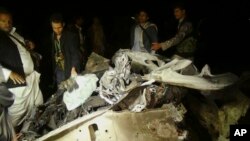Geneva peace talks involving Yemen's warring factions have failed to produce a cease-fire agreement, or even a humanitarian truce.
Although the delegations in Geneva refused to sit down together, U.N. special envoy Ismail Ould Cheikh Ahmed said there was "a certain willingness from all the parties to at least discuss issues around the cease-fire."
"We managed to get suggestions from both sides that we can build upon in coming days in order to reach a permanent agreement," Ahmed said.
The Houthis seized Yemen’s capital, Sana’a, in September before surging on to the second city of Aden. Yemeni President Abdu Rabu Mansour Hadi and his government are in exile in Saudi Arabia. A coalition of Arab countries, led by Saudi Arabia, has mounted a bombing campaign against the Houthis.
Former U.S. ambassador to Yemen Stephen Seche says the U.N. can still play a crucial role in pushing the warring factions toward a political settlement.
“If the U.N. can get the parties to agree on a cessation of the hostilities, then it can try to restart the original framework of negotiations,” he said.
Having failed to force the Houthis and their allies out of Yemen’s main cities, Seche says, Saudi Arabia and the Yemeni government in exile may be willing to adopt a new strategy.
According to Professor Charles Schmitz of Towson University in Baltimore, Maryland, the gap between the warring factions is too wide even to allow for more humanitarian relief.
“That is becoming the major factor that is pushing politically the two sides, as the country has been cut of food and fuel, creating a major humanitarian crisis," said Schmitz, adding that he doesn’t expect a political settlement any time soon.
“It would be a long time before reaching that point,” he said. “I would not expect that to happen for another two years.”
While the Saudis want to “restore Abdu Rabu Mansour Hadi as head of government, and demilitarize the Houthi movement,” the Houthis “want to guarantee their security in post-war Yemen and their political weight in the north.” So unless the Saudis and their allies are willing to compromise and accept the Houthis as an important part of Yemen’s future, he says, there is no light at the end of the tunnel.
Paul Salem, vice president of policy and research at the Middle East Institute, said he agrees, but that the Houthis and their allies need “ultimately to accept pulling back from the positions they seized and negotiate their roles within the context of an inclusive political settlement.”
The key compromise for the Houthis, Salem says, will be to recognize that “President Hadi has to be a key part of the way back toward a political process whether there will be ultimately a transitional government or fresh elections of a new president.”




